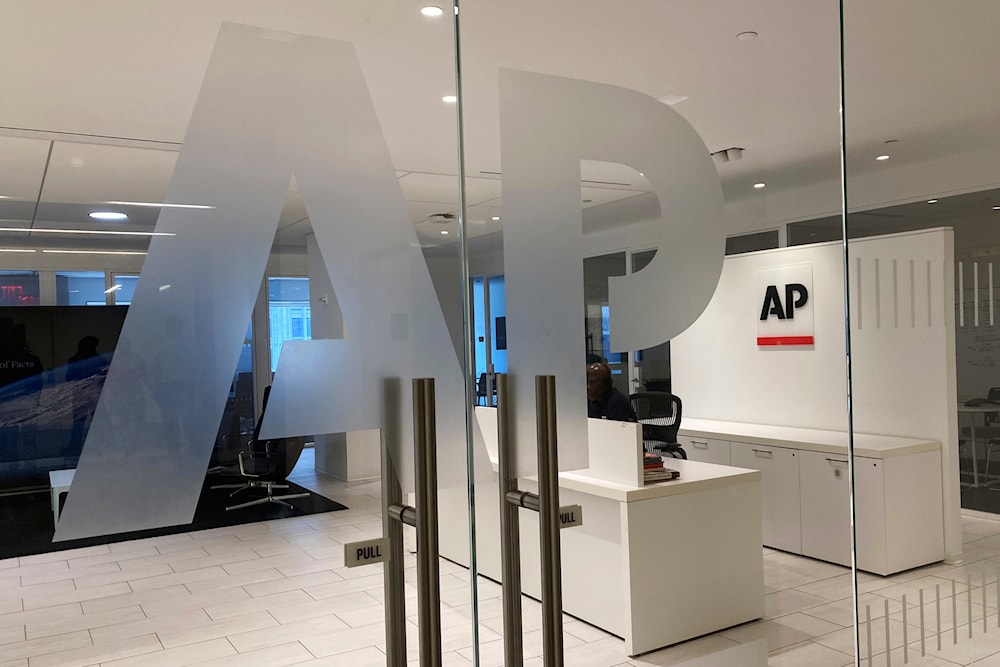AP reinstated to White House events after court ruling
A federal judge ruled that the White House must restore the Associated Press' full access to cover presidential events, affirming that the government cannot punish the news organization for its speech, based on First Amendment rights.
-

The Associated Press logo is shown at the entrance to the news organization's office in New York on July 13, 2023. (AP)
A report by the Associated Press (AP) on Wednesday revealed that a federal judge ordered the White House on Tuesday to restore AP's full access to cover presidential events, ruling that the government cannot punish the news organization for the content of its speech based on First Amendment protections.
US District Judge Trevor N. McFadden, a Trump appointee, decided that the government cannot retaliate against AP for refusing to comply with the president’s executive order to rename the Gulf of Mexico. This preliminary injunction marked a significant victory for AP amid the White House's ongoing challenges to the press.
“Under the First Amendment, if the Government opens its doors to some journalists—be it to the Oval Office, the East Room, or elsewhere—it cannot then shut those doors to other journalists because of their viewpoints,” McFadden stated. “The Constitution requires no less.”
According to the report, it remained uncertain whether the White House would act immediately to enforce McFadden’s ruling. The judge delayed implementing his order for a week, allowing time for the government to respond or appeal. Shortly after the ruling, an AP reporter and photographer were blocked from joining a motorcade with the White House press pool to cover Trump’s appearance before the National Republican Congressional Committee.
Since February 11, AP has been barred from being part of the small group of journalists covering Trump in the Oval Office or aboard Air Force One, although it has occasionally been allowed to attend events in the East Room.
“We are gratified by the court’s decision,” said AP spokesperson Lauren Easton. “Today’s ruling affirms the fundamental right of the press and public to speak freely without government retaliation. This is a freedom guaranteed for all Americans in the US Constitution.”
White House Press Secretary Karoline Leavitt, who was named in the lawsuit, did not immediately respond to a request for comment. AP had filed the lawsuit on February 21 against Leavitt, White House Chief of Staff Susie Wiles, and Deputy Chief of Staff Taylor Budowich.
Media outlets on the defensive against Trump administration
The AP report mentioned that since re-entering office, Trump has aggressively targeted the media, with the FCC suing ABC, CBS, and NBC and seeking to cut funding for outlets like Voice of America, PBS, and NPR. AP sought a ruling that Trump's actions violated its First Amendment rights, but McFadden’s ruling didn’t guarantee a return to previous coverage practices for the AP.
“The Court does not order the government to grant the AP permanent access to the Oval Office, the East Room or any other media event,” he wrote. “It does not bestow special treatment upon the AP. Indeed, the AP is not necessarily entitled to the ‘first in line every time’ permanent press pool access it enjoyed under the (White House Correspondents Association). But it cannot be treated worse than its peer wire service either.”
The judge stated that his decision does not prevent government officials from selecting which outlets to grant interviews to or choosing which journalists' questions to answer during a news conference, according to the report.
“This is an important decision,” said Katie Fallow, deputy litigation director at the Knight First Amendment Institute at Columbia University, adding that “The First Amendment means the White House can’t ban news outlets from covering the president simply because they don’t parrot his preferred language."

 4 Min Read
4 Min Read










